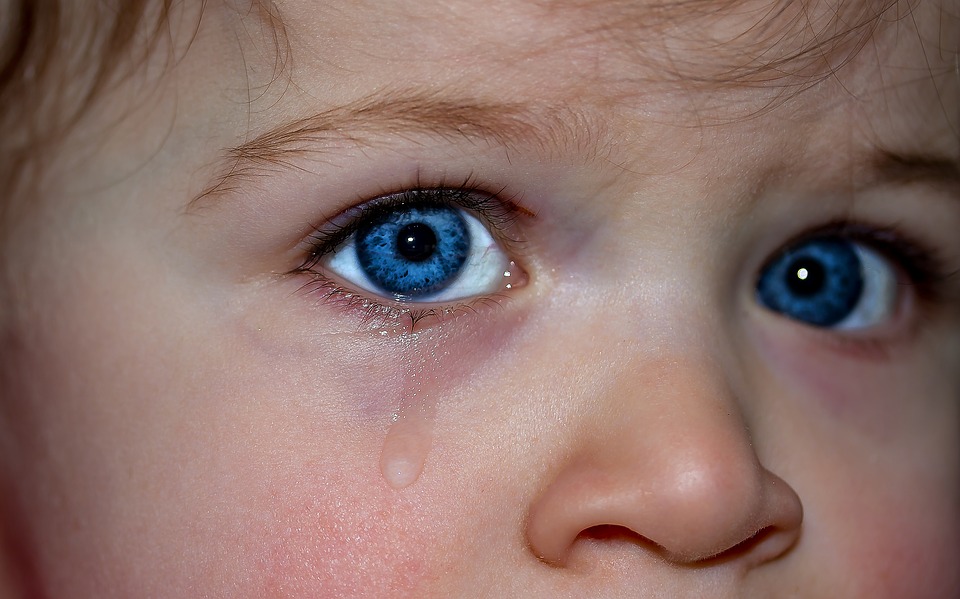Crying is the shedding of tears in the eyes in response to an emotional state which includes anger, sadness, and even happiness. When people get emotional and upset over little things, chances are they will cry and they ALMOST always feel better afterwards.
Some people would like to believe that crying is only for women and it’s a sign of weakness. However truth is, it’s not. It’s pretty easy to distinguish when someone’s been crying – wet face, red eyes.

What’s not so clear? Why your body thinks sending salty liquid out of your eyes is an appropriate response to being emotional on something. Turns out, what happens when you cry is the result of an interesting chain reaction in your body. In addition, once it triggers, it’s pretty hard to close the floodgates. Here’s a look at what goes on in your body when you cry—and the weird reason why you’ll probably feel better after your “mournfest” is over.
You feel an intense emotion which makes the endocrine system sends hormones that release the tears.
Maybe you just got some really not so good news? Extreme emotions like sadness, anger, stress; even extreme happiness are processed in your body as a sign of danger. A pea-sized gland in your brain that’s connected to your autonomic nervous system, explains Ray Chan, M.D., an ophthalmologist at Texas Health Arlington Memorial Hospital. The autonomic nervous system handles functions that you don’t have any control over, like body temperature, hunger, thirst, and also crying. The endocrine system, which is responsible for producing hormones, causes the eyes to fill up with tears.
Your body goes into fight or flight mode, and you feel that lump in your throat.
During emotional build up, cortisol, a stress hormone released by the brain makes the autonomic nervous system jump-start the sympathetic nervous system; this accelerates the fight-or-flight response. To help you prepare for impending doom, the fight-or-flight response tries to stop you from performing any nonessential functions, like eating or drinking. As a result, cortisol also slows breathing and creates tension in throat and swell up, making your throat feel full and tight. “The body is trying to protect you so you don’t accidentally get any nasal secretions or tears in your lungs,” says Patricia Salber, M.D., founder of The Doctor Weighs In.
With your fight-or-flight system fully alerted, you might also experience other symptoms normally associated with sheer terror. Your heart rate might increase, your lips start to quiver, and your voice gets shaky.
Your tears can work as medicine
Not the literal thing that you take as medicine or antibiotic, tears aren’t exactly like taking an antibiotic, but some studies have shown that tears actually can have a similar effect as certain medicines. Tears are known to contain lysozyme, which acts as an antibacterial agent. In addition to that, it can also help prevent common sicknesses like the common cold, cough, etc.
When we cry, our bodies get rid of toxins.
All this emotion tells your hypothalamus to produce the chemical messenger acetylcholine. Acetylcholine binds to receptors in your brain that send signals to the lachrymal glands—small glands that live beneath the bony rim of your eyes, explains Dr. Chan. When these glands are stimulated, they start to produce tears. If you only shed a few, they might drain back into your punctums—the tiny tear duct openings at the inner corners of your eyes. But that reservoir fills up pretty quickly. And when it does, the tears will start to drip out of your eyes and stream down your face, Dr. Salber says. The tears will also start to flood your nasal cavity and come out of your nose. The emotional tears reduce pain and help improve moods. This is an important detox because it helps to reduce stress immediately.
You signal to other humans that you’re in pain.
Humans remain the only species that produce actual tears but experts don’t completely know why intense emotions make us cry. But they have plenty of theories. Some evolutionary theorists think that the purpose of crying is to send a signal to others that we’re in pain and need help and trigger their sympathy.
“Emotional tears have more protein, and there’s speculation that the protein makes the tears thicker, so they’re more likely to h**g onto your cheek and send a signal of visual distress,” Dr. Salber says.
Tears may also have a protective mechanism, explains Dr. Chan. They literally coat the surface of your eye, acting like shields to protect your eyes during a dangerous situation. Some experts even think that tears are the body’s way of telling you to throw up a white flag during a fight: The salty drops blur your vision, making you less likely to act aggressive or defensive.
But when it’s all over, you might actually feel better. Tears, are really little helpers from your brain to your face to help blunt the situation.
When you’re about to cry, your first instinct might be to try to hold back those tears. But letting them out might actually be the smarter move. Tearing up can also signal your brain to release endorphins called leucine-enkephalins, which act like pain relievers to boost your mood. “So people start to feel a sense of relief,” says Dion Metzger, M.D., a psychiatrist based outside of Atlanta.
But this uplifting effect doesn’t happen to everyone. One study examining over 1,000 crying episodes of 97 women, published in the Journal of Research in Personality in 2011 found that the mood benefits of crying are selective and may be shaped by the social environment and affective characteristics of the crier. People with mood disorders like anxiety or depression are also less likely to experience the positive benefits of crying, Dr. Metzger says.
So, depending on your circumstances, crying might make you feel better, or it could simply remain a byproduct of human evolution. After all, there’s no shame in shedding a few tears every now and then, right?

